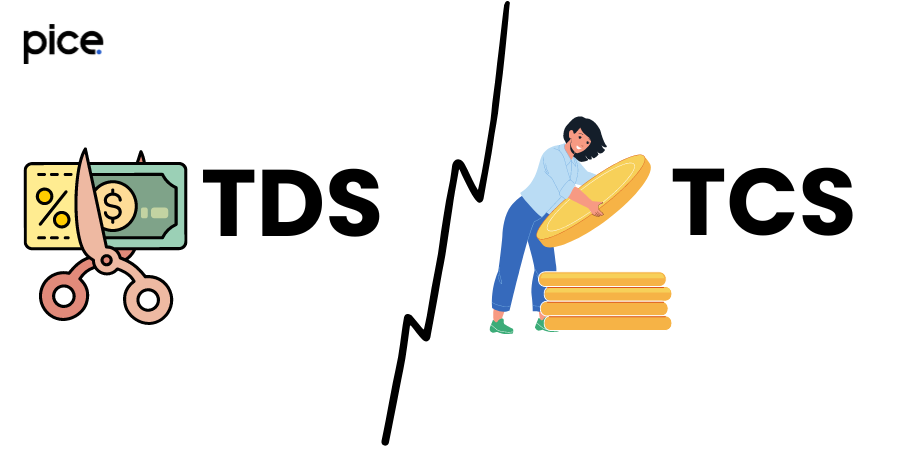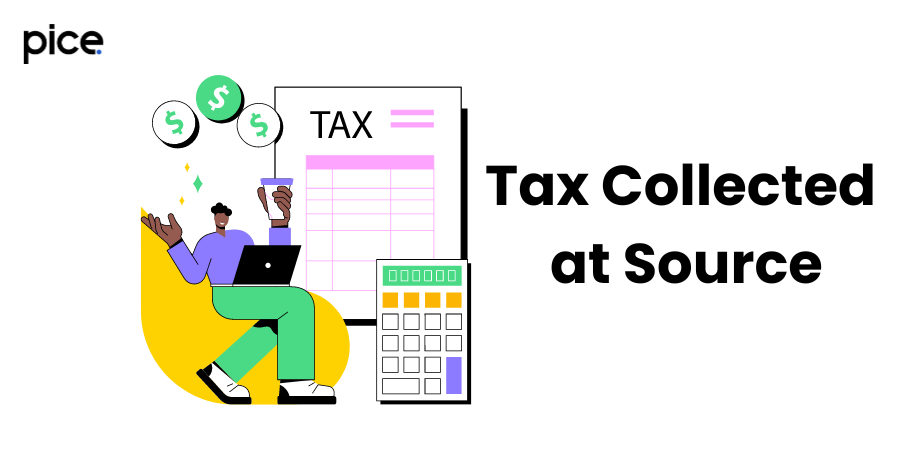Differences Between TDS and TCS
- 20 Sep 24
- 13 mins

Differences Between TDS and TCS
Key Takeaways
- TDS ensures continuous tax collection from various types of income, simplifying the process of filing income tax returns.
- TCS is collected at the point of sale, ensuring proper tax collection on high-value transactions and reducing GST liability.
- Both TDS and TCS help streamline business compliance by ensuring taxes are deducted or collected accurately at the source.
- Proper management of TDS and TCS is essential for fulfilling obligations under business contracts, preventing legal and financial penalties.
- Filing regular returns for TDS and TCS under GST is mandatory, ensuring transparency and accurate reporting of GST liability.
Tax Deducted at Source (TDS) and Tax Collected at Source (TCS) are two important mechanisms used by the Indian government to ensure smooth tax collection and compliance. Although they serve similar purposes, there are key differences in their application and implementation.
Understanding TDS

Tax Deducted at Source (TDS) is a means of collecting income tax at the point of generation of income. The Indian government mandates that certain payments such as salaries, interest, commission, and rent must have tax deducted at the time of payment. This helps in minimizing tax evasion by ensuring that taxes are collected regularly throughout the year.
TDS applies to various types of payments, including salaries, interest on securities, dividends, and payments to contractors and professionals. The amount of TDS deducted depends on the income tax slab applicable to the taxpayer. The entity making the payment, known as the deductor, is responsible for deducting TDS before making the payment to the recipient, known as the deductee. The deducted amount is then deposited with the government.
One of the primary benefits of TDS is that it provides a continuous flow of revenue to the government, ensuring a steady stream of funds for public expenditure. Additionally, it helps in the early collection of taxes, reducing the burden of tax payments at the end of the financial year for taxpayers.
Benefits of TDS
The primary advantage of TDS is that it ensures a steady flow of revenue to the government. By deducting taxes at the time of payment, the government can maintain a regular cash flow, which is crucial for funding various public services and development projects. This mechanism also reduces the likelihood of tax evasion since taxes are collected at the source of income.
For taxpayers, TDS simplifies the tax payment process by distributing the tax liability over the year, rather than accumulating it at the end of the financial year. This makes financial planning and compliance easier. Additionally, since TDS is deducted before the income reaches the taxpayer, it minimizes the risk of defaulting on tax payments.
Drawbacks of TDS
Despite its benefits, TDS has some drawbacks. One of the main disadvantages is the administrative burden it places on businesses and other deductors. They must ensure accurate calculation, timely deduction, and proper deposition of TDS to the government. This requires robust accounting systems and can increase operational costs.
Another drawback is the potential for cash flow issues for taxpayers, especially small businesses or individuals with limited liquidity. Since TDS is deducted at the source, it reduces the immediate available income, which can impact financial decisions and operations. Furthermore, errors in TDS calculations or delays in deposit can lead to legal consequences, including penalties and interest charges.
Understanding TCS

Tax Collected at Source (TCS) is another mechanism for collecting indirect taxes. Under TCS, the seller collects tax from the buyer at the time of sale of specified goods and services. This system is primarily used for transactions involving goods like alcohol, timber, scrap, and minerals. The collected tax is then deposited with the government by the seller.
TCS is governed by the provisions of the Income Tax Act, which specifies the goods and services subject to TCS, as well as the applicable tax deduction rates. The objective of TCS is to widen the tax base and ensure that taxes are collected from the consumption of certain goods and services, thereby reducing tax evasion and increasing government revenue.
One of the key differences between TDS and TCS is the point of collection. While TDS is deducted at the source of income, TCS is collected at the time of sale. This makes TCS particularly effective for transactions involving high-value goods and services, ensuring that taxes are collected from consumers who might otherwise avoid paying them.
💡 If you want to pay your GST with Credit Card, then download Pice Business Payment App. Pice is the one stop app for all paying all your business expenses.
Benefits of TCS
TCS provides several benefits, particularly in terms of tax compliance and revenue collection. By collecting tax at the time of sale, TCS ensures that taxes are collected from transactions involving specified goods and services, reducing the scope for tax evasion. This mechanism helps in widening the tax base and increasing government revenue.
For the government, TCS simplifies the tax collection process and ensures a steady stream of revenue from the consumption of certain goods and services. For businesses, TCS can simplify tax compliance by consolidating tax collection at the point of sale, reducing the need for complex accounting systems to track tax liabilities.
Drawbacks of TCS
TCS also has its drawbacks, primarily related to its impact on cash flow and administrative burden. For buyers, TCS increases the cost of purchasing specified goods and services, which can impact financial planning and decision-making. The additional tax burden can be particularly challenging for small businesses and individuals with limited liquidity.
For sellers, TCS imposes an administrative burden, requiring them to calculate, collect, and deposit the tax with the government. This can increase operational costs and require robust accounting systems to ensure compliance. Failure to comply with TCS regulations can result in legal consequences, including penalties and interest charges.
Examples of TDS and TCS in Practice
TDS and TCS are applied in various practical scenarios, each serving specific purposes within the tax collection framework. For example, TDS is commonly used in salary payments, where employers deduct a portion of the employee's salary as tax before making the payment. Similarly, TDS is applied to interest payments on fixed deposits, commissions paid to agents, and rent payments exceeding specified thresholds.
On the other hand, TCS is typically applied in transactions involving the sale of goods like alcohol, timber, and scrap. For instance, a timber merchant collecting tax from buyers at the time of sale and depositing it with the government exemplifies TCS in practice. E-commerce operators are also subject to TCS, where they collect tax from sellers for transactions conducted on their platforms.
These examples illustrate how TDS and TCS operate in different contexts, each playing a crucial role in ensuring tax compliance and revenue collection for the government.
Distinguishing Between TDS and TCS
The primary distinction between TDS and TCS lies in their point of collection and application. TDS is deducted at the source of income, ensuring that taxes are collected from various payments like salaries, interest, and rent. In contrast, TCS is collected at the time of sale of specified goods and services, ensuring that taxes are collected from transactions involving high-value items.
Another key difference is their impact on cash flow and compliance. TDS can impact the cash flow of taxpayers by reducing their immediate available income, while TCS increases the cost of purchasing specified goods and services. Both mechanisms require robust accounting systems and timely compliance to avoid legal consequences, including penalties and interest charges.
Understanding these differences is crucial for businesses and individuals to ensure proper tax compliance and avoid potential legal issues.
Responsibility for Deducting TDS and TCS
The responsibility for deducting TDS and TCS lies with different entities, depending on the type of transaction. In the case of TDS, the deductor (the entity making the payment) is responsible for deducting the tax at the source and depositing it with the government. This includes employers, financial institutions, and businesses making payments exceeding specified thresholds.
For TCS, the seller is responsible for collecting the tax from the buyer at the time of sale and depositing it with the government. This applies to transactions involving specified goods and services, such as alcohol, timber, scrap, and certain e-commerce transactions. E-commerce operators are also responsible for collecting TCS from sellers on their platforms.
Both TDS and TCS require timely compliance and accurate accounting to avoid legal consequences and ensure smooth tax collection.
Consequences of Not Depositing TDS or TCS
Failing to deposit TDS or TCS can result in serious legal consequences, including penalties, interest charges, and potential prosecution. The Indian government imposes strict regulations to ensure timely compliance and accurate tax collection, and failure to adhere to these regulations can lead to significant financial and legal repercussions.
For TDS, the deductor may face penalties for late deposit, incorrect deduction, or failure to deduct tax at all. These penalties can include interest charges on the delayed amount, fines, and potential prosecution in severe cases. Similarly, for TCS, the seller may face penalties for failing to collect or deposit the tax on time, along with interest charges on the unpaid amount.
These consequences underscore the importance of timely compliance and accurate accounting for both TDS and TCS to avoid potential legal issues and financial burdens.
TDS vs. TCS in GST
Under the Goods and Services Tax (GST) regime, both TDS and TCS have specific provisions to ensure smooth tax collection and compliance. TDS under GST is applicable to payments made to suppliers of goods and services by specified entities, including government departments and large businesses. The tax is deducted at a specified rate and deposited with the government, helping to reduce tax evasion and improve compliance.
TCS under GST applies to e-commerce operators, who are required to collect tax from sellers for transactions conducted on their platforms. This ensures that taxes are collected from online sales, which can be challenging to track and regulate. The collected tax is then deposited with the government, ensuring proper revenue collection from the growing e-commerce sector.
Benefits of TDS and TCS Under GST
The integration of TDS and TCS under GST provides several benefits, including improved tax compliance, reduced tax evasion, and a more transparent tax collection process. By deducting tax at the source of payment or collecting it at the time of sale, these mechanisms ensure that taxes are collected from a wide range of transactions, broadening the tax base and increasing government revenue.
For businesses, TDS and TCS under GST simplify the tax compliance process by providing clear guidelines and reducing the need for complex accounting systems. The use of electronic cash ledgers and other digital tools further streamlines the process, making it easier for businesses to comply with tax regulations and avoid potential legal issues.
Effect of TCS in GST on e-Commerce Operators
The implementation of TCS under GST has a significant impact on e-commerce operators, ensuring that taxes are collected from online transactions and deposited with the central government. This helps to regulate the growing e-commerce sector and reduce tax evasion, ensuring that proper revenue is collected from online sales.
For e-commerce operators, TCS under GST requires robust accounting systems and timely compliance to avoid legal consequences. The collected tax must be accurately calculated and deposited with the government, ensuring transparency and proper revenue collection. This mechanism also helps to level the playing field between online and offline businesses, ensuring fair competition and proper tax compliance across all sectors.
In conclusion, both TDS and TCS play crucial roles in India's tax collection framework, each serving specific purposes and providing unique benefits and challenges. Understanding the differences between these mechanisms and ensuring timely compliance is essential for businesses and individuals to avoid potential legal issues and contribute to the country's revenue collection efforts.
 By
By 


















